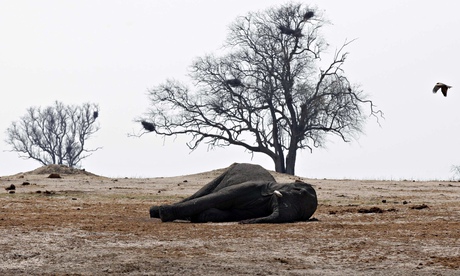More African elephants are being killed for ivory than are being born, despite poaching levels falling for the fourth year in a row in 2015.
The new data, released on UN world wildlife day on Thursday, shows about 60% of elephant deaths are at the hands of poachers, meaning the overall population is most likely to be falling.
“African elephant populations continue to face an immediate threat to their survival, especially in central and west Africa where high levels of poaching are still evident,” said John Scanlon, secretary-general of the Convention on the Trade in Endangered Species (Cites), which collects the data. At least 20,000 elephants were killed for ivory in 2015.
But Scanlon said there were some encouraging signs, including in parts of eastern Africa, such as in Kenya, where the poaching trend has declined.
“This is showing us all what is possible through a sustained and collective effort with strong political support,” he said. “The momentum generated over the past few years is translating into deeper and stronger efforts to fight these crimes on the front line, where it is needed most – from the rangers in the field, to police and customs at ports and across illicit markets.”
Elephant poaching peaked in 2011, when it accounted for about 75% of all deaths. Poaching has gradually reduced since then but remains well above sustainable levels. Scanlon said even greater efforts were needed to fully reverse the trend.
The new report revealed that a “troubling” upward trend in elephant poaching was observed in the Kruger national park in South Africa for the first time in 2015. The proportion of elephants killed by poaching jumped from 17% in 2014 to 41% last year. “While [this] is still below the sustainability threshold, the substantial increase in what had been one of the most secure sites for elephants in Africa is a cause for concern,” said the report.
In January, poachers shot down a helicopter in Tanzania and killed its British pilot during an operation to track down elephant killers while, in October last year, 14 elephants were poisoned by cyanide in Zimbabwe.
As well as action to toughen law enforcement and increase the penalties for wildlife crime, publicity campaigns have attempted to deter people from buying illegal wildlife products. In October, just before China’s president visited the UK, Prince William told Chinese citizens to stop buying illegally traded wildlife products. Other campaigns have featured sports stars including Andy Murray, Rahul Dravid, Francois Pienaar and Yao Ming.
Interpol estimates the illegal wildlife trade is worth $10-20bn a year, the fourth most lucrative black market after drugs, people and arms smuggling and it is often linked to organised crime. The UN says it not only harms endangered wildlife but also fuels conflicts, feeds corruption and undermines poverty eradication efforts.











